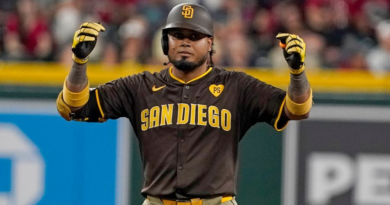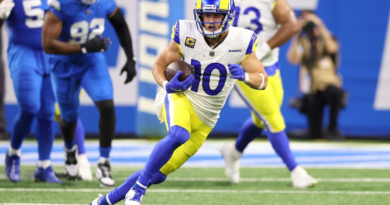Breaking down Ten Hag's FA Cup triumph, Barca's poor Xavi treatment, more
The European soccer season concluded with domestic cups in England and Germany up for grabs as well as the final round of games in Italy, Spain and France, and boy did we get some talking points. Manchester United‘s embattled manager Erik ten Hag dialed it in perfectly to spring an FA Cup shock over Manchester City, Barcelona bid farewell to Xavi in less than gracious circumstances, and Bayern Munich seemed to settle on Vincent Kompany as their new manager. Wild, right?
Elsewhere, Bayer Leverkusen shrugged off the loss of their unbeaten season — after being resoundingly beaten by Atalanta in the UEFA Europa League final — to win the German Cup, Chelsea moved on from Mauricio Pochettino as manager, Kylian Mbappé had his final game as a Paris Saint-Germain player, Real Madrid said “adios” to Toni Kroos (and also previewed their likely Champions League final starting XI) — and much, much more.
– Stream on ESPN+: LaLiga, Bundesliga & more (U.S.)
It’s Monday. Gab Marcotti reacts to the biggest moments in the world of football.
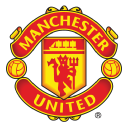
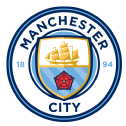 It might not save his job, but Erik ten Hag has gotten most things right on the pitch and triumphed off it in the FA Cup final
It might not save his job, but Erik ten Hag has gotten most things right on the pitch and triumphed off it in the FA Cup final
Yes, he has taken the brunt of criticism and derision for much of the year. Some of it unwarranted, some of it because he was unprepared (understandable: at Ajax, he had a highly visible chief executive and sporting director who spoke often; at United, he was the only voice), some of it because he made poor decisions. But on Saturday, Erik ten Hag got everything right, setting up Manchester United in the most effective way possible to blunt Manchester City and win the FA Cup.
Yes, it was based on counterattacking and transition. Yes, it relied on opposition mistakes. Yes, if City had scored first and forced United out of their shell, this could have been a thumping. But he maximized United’s chances of getting a result given their quality (and Manchester City’s), and got total buy-in from the players, which is what you want in a final.
Pep Guardiola might not have liked it, which is why he responded “no” when asked if United was the better team at Wembley. He noted how City had chances in the second half, whereas his opponents were “always a transition team.” Break it down to individual incidents, and you get his point.
Take out the howler that led to Alejandro Garnacho‘s opener and City won the xG battle 1.33 to 0.69. Use the eye test and you’ll note that Erling Haaland hit the crossbar, Julián Álvarez should have done better and André Onana made some big saves. Fine, but that also means ignoring a first half that saw City defend poorly while also managing just three shots on goal.
Sometimes, more than one thing can be true. Viewed through a purely footballing sense, City might have been “the better team.” But equally, it doesn’t mean United weren’t deserving. On the contrary, United played closer to their ceiling than City did.
Ten Hag played the percentages and won, but more than that, two intangibles matter here. One is that the players, again, followed him until the end. It has been a theme this season: with one or two exceptions, they put in effort and showed belief in their boss. That’s not easy to do when you’re as bad as they’ve been and when you know he’s facing the axe one way or the other.
The other is the line he delivered after the game: “We have to do better and if they [Manchester United] don’t want me anymore then I’ll go somewhere else to win trophies because that is what I have done my whole career.”
Swish. Ten Hag nailed it. Regardless of whether he stays or goes, regardless of whether he ever wins anything other than the Wordle in his life.
1:44
Ranking Man United’s potential candidates to replace Ten Hag
Don Hutchison debates who would be the best replacement for Erik ten Hag if he leaves Man United.
By Monday morning, reports had United convening a “review” to decide whether he should stick around. Much was made of the fact that Sir Jim Ratcliffe thanked the “players and staff,” but not Ten Hag by name, in his statement celebrating the win. Not the classiest move towards a guy who faced the bullets all year, mostly alone, and gave the club a rare moment of delight to end the campaign.
Should they move on from Ten Hag? Probably. New sheriffs in town (Omar Berrada, Dan Ashworth, Dave Brailsford, Ratcliffe himself) tends to mean new blood on the bench. With the zillion mitigating factors Ten Hag can cite (and often has), this was still an underachieving campaign and, more importantly, in two years at the club we’ve seen very little of what he was brought in to do: replicate what he achieved at Ajax in terms of style and approach.
The issue shouldn’t be about “merit” or “deserving” to stay at this stage, it should simply be about whether the new guys in charge can get a coach who is more likely to take United where they want to go. Apply that criteria, and Ten Hag is gone. Head held high, but still: gone.
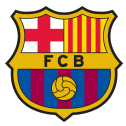 Xavi leaves Barcelona with his head held high … and with plenty of support from the players
Xavi leaves Barcelona with his head held high … and with plenty of support from the players
They didn’t have to do this. They could have celebrated the win and the end of the season, hidden behind the usual canned postgame phrases and thanked their departing boss in the customary milquetoast way. Instead, the vast majority of Barcelona’s players made it a point to embrace Xavi after the 2-1 win away to Sevilla. Heck, skipper Marc-André ter Stegen referenced him no fewer than four times in a postmatch flash interview.
The Barca performance spoke volumes, too. Last day of the season, nothing to play for, away from home — they could easily have mailed it in. Instead, they played with intensity, driven by Fermín López doing his best Gavi impression and Ter Stegen coming up with some big saves.
2:48
Are Barcelona looking for a ‘fresh start’ by sacking Xavi?
Sam Marsden discusses what led Barcelona president Joan Laporta to sack Xavi Hernández as the team’s head coach.
You could argue it doesn’t matter because Xavi is gone and someone else — presumably Hansi Flick — is on his way, but it’s the manner of his departure that rankles. He announces he’s going, the team goes on a great run, everybody wants him to stay, he has the temerity ahead of the Almeria match to say what everybody knows — that next season will be tough given all the financial restrictions on the club — and suddenly he’s frozen out. Rightly or wrongly, the narrative is that club president Joan Laporta doesn’t like negativity and wants everyone to have a permanent sunny disposition like he does.
Salary limits? More levers? Mega-debt accrued under Josep Bartomeu? Nothing to see here, move on. Don’t be a Negative Nellie.
There’s a classy way and there’s a crappy way to change managers, and a club legend like Xavi got the latter. This after a season where, for all the difficulties — a fantasy football approach to the transfer market leading to a badly assembled squad, injuries to key players, the Montjuic, Laporta’s levers, etc. — they finished with 85 points. That’s just three less than last season, which incidentally was one of only two seasons in their entire history in which they gained more points, if you exclude the years Lionel Messi was there.
But maybe you’re not convinced by any of that. Maybe you think that Flick can take Barca higher. Maybe. But hopefully you’ll at least agree this was no way to treat Xavi.
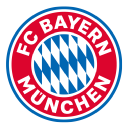 Sure, without the many coaches who rejected the gig before him, Vincent Kompany would not be heading to Bayern Munich … but so what?
Sure, without the many coaches who rejected the gig before him, Vincent Kompany would not be heading to Bayern Munich … but so what?
By the time you read this, Vincent Kompany might well be the new Bayern manager. OK, so it’s obvious he wasn’t the first or second, or maybe even seventh, eighth or ninth choice. And yes, as many pointed out, his coaching resume is pretty thin: two years at Anderlecht, where he finished fourth and third (which is a little like finishing fourth and third with, say, Juventus in Serie A), promotion from the Championship with newly relegated Burnley and, last season, second bottom of the Premier League with the second-most defeats and second-fewest goals scored.
But… so what? None of this will matter if he succeeds at Bayern (whichever way the Bavarians choose to define success, which is highly mutable). If he fails, he’ll be fired and someone will probably get the boot, as often happens in the club’s Sabener Strasse HQ when you get hiring decisions wrong. He’ll start 2024-25 at the club with low expectations (“Just get the Meisterschale back, Vinny”) and a low(ish) salary.
2:17
Gab & Juls call Bayern’s Kompany decision a ‘massive gamble’
Gab Marcotti and Julien Laurens react to the news that Burnley boss Vincent Kompany is expecting to take charge of Bayern Munich.
More interesting is the fact that Bayern made a bold choice. Viewed from the outside, there are a number of evident reasons. Kompany is charismatic and will engage the fan base. He speaks very well (and speaks Germán too) and wins people’s trust easily. He’s from the Pep Guardiola coaching tree, and lest we forget, Guardiola is the one former Bayern manager who is still revered around these parts. (You also wouldn’t be surprised if he had put in a good word as well.) He wants to play progressive attacking football, which obviously worked well in the Championship, albeit less so in the Premier League, where his group of players were either injured, markedly worse than the league average or, often, both.
That’s a bunch of boxes ticked and, potentially, a huge upside. Besides, if it doesn’t work out, they can say they’ve gone all Silicon Valley with the “fail fast, learn faster” approach.
Quick hits
TEN — Xhaka redemption as Bayer Leverkusen win the German Cup: OK, I’ll admit it. I was totally wrong. I was one of those guys who thought Arsenal robbed Bayer Leverkusen when they managed to get a €25m transfer fee for Granit Xhaka on the eve of his 31st birthday and with one year left on his deal. He has a nice left foot, works hard, boasts leadership qualities … but really? Instead, Xhaka has been arguably as important as any player on the pitch for Xabi Alonso in this record-breaking season. Three days after being humiliated by Atalanta (and getting schooled by Ademola Lookman) in the Europa League final, Xhaka was imperious in the 1-0 win over Kaiserslautern to secure the German Cup. He settled nerves by scoring a gorgeous goal and then led the defensive stand after Leverkusen went down to 10 men. That’s a leader for you, one worth every darn penny they paid to get him.
NINE — Kylian Mbappe closes the book on Paris Saint-Germain with the domestic double: He admitted it himself, saying he felt the “weight” of his decision because now “it’s really over.” After 256 goals in 308 appearances and a domestic league-cup double, he won’t play for PSG again, barring some late-career nostalgia tour. The reported bad blood with a portion of the fan base (though not the Ultras) and president Nasser Al-Khelaifi in his last home appearance won’t change his legacy on the pitch. You hesitate to talk of gratitude — he’s a professional, the club paid him handsomely for his services — but it’s fair at least to say that, unlike some of his teammates during that stint, he more than lived up to the billing.
EIGHT — Chiesa and Fagioli belong in the next great Juventus reboot: Both starred in the 2-0 thumping of Monza, the former scoring a great goal and hitting the woodwork, the latter also striking the crossbar and pulling the strings in midfield. It’s fitting because each, in his own way, could be pivotal in Juventus’ short-term future. Fagioli, having missed most of the season for his gambling addiction and subsequent ban, came back with a bang and was rewarded with a Euro 2024 call up for Italy as well. Whoever Juve’s next manager is (probably Thiago Motta) should consider building the midfield around him. Chiesa could be key in a different way, either on the pitch if he stays fit (a big “if”), or moving on and netting Juve the sort of transfer fee that lets them rebuild.
SEVEN — Heartbreak for Sorloth as injury, Dovbyk deny him the Pichichi Trophy: It was one of the few unresolved questions of the final weekend in LaLiga. After Artem Dovbyk‘s hat trick in Girona‘s 7-0 drubbing of relegated Granada on Friday put the Ukrainian one goal ahead of Alexander Sorloth in the race for top scorer in Spain, how would the big Norwegian respond? We never got to see it, because a muscular injury saw him come off early in the match. Still, it’s 23 league goals for Sorloth (all from open play) and 24 for Dovbyk. It’s also the first time since 2007-08 (take a bow, Dani Guiza!) that two guys from someone other than Real Madrid or Barca finish first and second in the scoring table. Are they one-season wonders? Time will tell, but even if so, what a season it was.
SIX — Kroos the “iceman” melts, and we get a glimpse of Real Madrid’s Champions League final XI: This weekend’s scoreless draw against Betis really had only two points of interest. You wanted to see Toni Kroos’ final moments at the Bernabeu, culminating in a hugely emotional standing ovation that saw him in tears. And you wanted a sense of Carlo Ancelotti’s likely starting lineup for the Champions League final against Borussia Dortmund. The fact that Aurélien Tchouaméni was nowhere to be seen suggests he won’t recover and that Eduardo Camavinga will step into midfield in his place, while Thibaut Courtois ahead of Andriy Lunin between the sticks suggests Ancelotti’s mind is made up there too. Also, choosing Nacho (also likely in his final appearance at the Bernabeu) ahead of Éder Militão is a strong hint that he’ll start at Wembley too. Ancelotti can be sentimental, but with all the love in the world for Nacho (and, trust me, there’s a lot) there is no multiverse in which a fully fit Nacho is a better option than a fully fit Militao. You can only conclude the Brazilian isn’t quite where he should be in terms of fitness after his long layoff.
FIVE — Milan say farewell to Stefano Pioli and Olivier Giroud … but will they get the right replacements? We know that, most likely, it will be Lille‘s Paulo Fonseca who will take over as Milan manager from Pioli. He’s reportedly even willing to turn down more lucrative offers. However, we have no idea who Milan’s next centre-forward will be: they’ve been linked with everyone from Benjamin Sesko to Jonathan David. Giroud leaves big boots to fill. It’s not just his goals — he notched his 15th in the league in the 3-3 draw with Salernitana, a gorgeous volleyed blend of intelligence, technique and physicality — it’s his presence, charisma and team-first mentality. He turns 38 in September, so he’s ready to move on (LAFC is his next stop) but you wonder if Milan aren’t better off tweaking the way they play rather than trying to find someone who can impersonate Giroud. As for Pioli, the reaction from much of San Siro and his own players (witness the bear hugs from Rafael Leão) suggests that maybe the negativity surrounding him came more from the usual online keyboard warriors than the folks who actually show up at San Siro.
FOUR — Real Sociedad and Atletico Madrid have to do better: Or maybe I just want them to be better because I don’t want the usual duopoly in LaLiga. Atleti beat La Real on the last day of the season 2-0 in a meaningless game, and it reminded just how disappointed I’ve been in both clubs. Real Sociedad played some of the best football in Europe at times this season, but yeah, when you drop off and your three centre-forwards (Umar Sadiq, André Silva and Sheraldo Becker) combine for just eight league goals, you’re going nowhere. As for Atletico, they have stability, they have talent and the third biggest budget in Spain and it all ends in a whimper. We’re still waiting for Diego Simeone 2.0.
THREE — Napoli end their season with a whimper and a snooze … but is Antonio Conte really the right wake-up call? If reports from Naples are to be believed, Antonio Conte will be the next Napoli boss (and the highest-paid manager in Serie A next season). Some will say he’s just the tonic after the insipid draw against Lecce on Sunday and that he’ll “shake things up.” He certainly often has that impact in the first season and the club — which fell from first to 10th — need a shake-up. To the usual Conte question — what happens when he complains about the quality of the players at his disposal, especially given the potential departure of Victor Osimhen and Khvicha Kvaratskhelia? — you can add another one: how will the famously ebullient and temperamental Aurelio De Laurentiis deal with the equally pugnacious Conte? I have no idea. But I’ll get my popcorn ready…
2:33
Why Enzo Maresca could be a ‘good fit’ for Chelsea
Gab Marcotti and Don Hutchison debate who could replace Mauricio Pochettino at Chelsea.
TWO — Opinions might differ on Pochettino, but it’s critical that they stick to the blueprint that led to his departure: Chelsea have a plan. It might turn out to be a stupid or poorly executed one, but it’s a plan: spend big on young talent, tie them down with long-term (but relatively low-wage) contracts and develop them into superstars. We are now in phase two of the plan. The players are in and while there likely will be tweaks to the squad, don’t expect them to chuck around another billion in new signings, which means the next phase is turning them into a winning team. That, presumably, is what Mauricio Pochettino, who parted ways with the club last week, was brought in to do. Now that he’s gone, it’s critical that the next coach be fully on board with the plan because, simply put, it would be foolish to deviate from the plan at this stage, you have to give it a chance to work. (Or not work, as the case may be.) My colleague James Olley wrote a comprehensive piece outlining what went wrong. Feel free to pick sides on whether Pochettino was harshly treated or not. But bear in mind, ripping up this blueprint with the next manager would be one of the dumbest — and most expensive — things the club could do.
ONE — Oaktree could asset-strip and destroy Inter … here’s hoping it doesn’t: Let’s be clear here. Oaktree, which essentially took control of Inter because the majority stakeholder (Suning) put up the club as collateral when they took out a $400 million-plus loan could take the easy way out and just sell off the club for parts. In this nightmare scenario, it chooses to shift stars like Nicolo’ Barella, Alessandro Bastoni, Lautaro Martínez, Marcus Thuram, David Frattesi, Denzel Dumfries and Fede Dimarco, get its money back (plus a little more on top) and then flog the shell of the club for a couple hundred million more, walking away with a very tidy profit. It says it won’t do that; it’ll be patient investors instead, looking to continue putting in money (it has to; Inter’s losses are down, but they still make them every year), improving how the club is run and eventually selling it for a billion or so (maybe more, if they can get it). The former is the safe, guaranteed-return approach; the latter has the bigger upside. I’m pretty sure they’ll go for the latter. At least, I pray they do.


